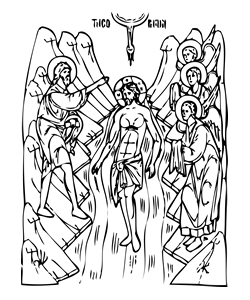|
|||
|---|---|---|---|
| This weekly bulletin insert complements the curriculum published by the Department of Christian Education of the Orthodox Church in America. This and many other Christian Education resources are available at http://dce.oca.org. | |||

Saint Paul writes these words to the Colossians: "Put to death what is earthly in you" (3: 5a). He names the earthly things that must be put to death: fornication, impurity, passion, evil desire, and covetousness, which is idolatry. This verse makes some people uncomfortable because its tone is militant. It urges us to make war on certain parts of ourselves, even actually to kill those parts. How can this talk of "putting to death" relate to Jesus Christ's gentle message of love and mercy? The 19th-century English hymn "Onward, Christian Soldiers" creates discomfort for some people in much the same way. They read its words, "Onward, Christian soldiers, marching as to war," as a call to take up arms and go out to kill others on a field of battle. But the important words in that line are "as to war." The same thought might be expressed by saying "as if to war." It isn't an actual battlefield war that the hymn is describing, but the kind of fight against sin and temptation that Saint Paul describes. In the next verses the hymn assures us that we can overcome Satan if we will faithfully worship God: "Hell's foundations quiver at the shout of praise...Gates of hell can never 'gainst that Church prevail; we have Christ's own promise and that can never fail." The Service of Baptism is replete with images of soldiering and war, the Christian's war on sin and Satan. As the priest blesses the water for baptism he identifies the crafty enemy: the "evil spirit which instills darkening of intentions and rebelliousness of thought." He prays that the one to be baptized will be protected from the "demon of darkness" that is able to conceal itself in the water. As he blesses the oil to be used for anointing, he prays that it may be an "armor of righteousness...to the averting of every assault of the devil." Then, during the rites of ablution and tonsuring, he asks God to "maintain the shield of his/her faith unassailed by the enemy." He prays that the baptized person will be "ever a warrior invincible in every attack of those who assail him/her and us, and make us all victors, even unto the end, through Thy crown incorruptible." In the Orthodox Church we honor a saint who knew the war of the battlefield very well. Saint Titus of the Kiev Caves began his adult life as a soldier, and then sustained a severe injury in war. He left the military to spend the rest of his life as a monastic, repenting for his sins. During his long years in the monastery he came to know the other kind of battle, the fight against sin and the work of repentance, equally well. Though he didn't live in 19th-century England or in the time of the apostle Paul, Saint Titus thoroughly understood the words of the English hymn, and also Saint Paul's exhortation to "put to death" the evil in us. |
|||
